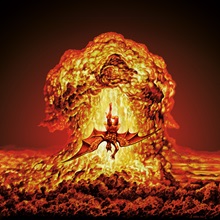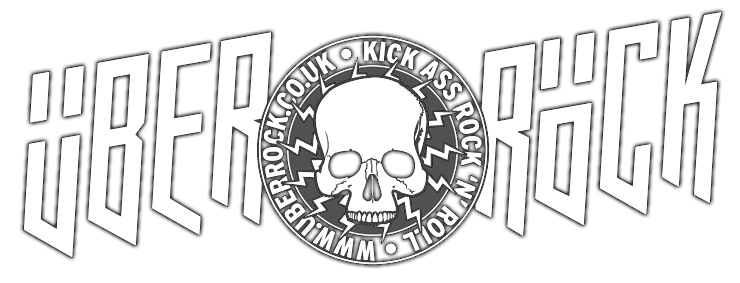By Georgia Smith
 Texas-based multi-instrumentalist and producer James Lollar returns as Gost with the sixth album ‘Prophecy’, a staggering, darkly euphoric crossover between black metal and EDM. This album wouldn’t be out of place in the blood rave scene from ‘Blade’, with its cold, clean electronica writhing through the thundering landscapes of its metal, struck through with cryptic commentary on the social and political state of America and the impending collapse of Western civilization. Lollar has taken what appear to be opposite ends of a spectrum and fused them together to create an album that is surprisingly effective, seamless, simultaneously rave-y and heavy, dark and light.
Texas-based multi-instrumentalist and producer James Lollar returns as Gost with the sixth album ‘Prophecy’, a staggering, darkly euphoric crossover between black metal and EDM. This album wouldn’t be out of place in the blood rave scene from ‘Blade’, with its cold, clean electronica writhing through the thundering landscapes of its metal, struck through with cryptic commentary on the social and political state of America and the impending collapse of Western civilization. Lollar has taken what appear to be opposite ends of a spectrum and fused them together to create an album that is surprisingly effective, seamless, simultaneously rave-y and heavy, dark and light.
Intentionally reflecting the anxieties and horror of a world so divided along social, political and religious lines, Gost is a project attempting to seek a source and solution. Lollar’s unique challenge of blending metal and electronica, he says, is an homage to the ‘Satanic Panic’ of the 1990s and the recent resurgence of it throughout America. With the album utilising newsreel soundbites, gunshots, sirens, ‘Prophecy’ becomes a twisted re-imagining of a modern America; one in which the darkest elements are ripe opportunities for musical creativity and rhythm. Gost’s debut came in 2013 with the ‘Radio Macabre’ EP, and six months later their debut full-length album ‘Skull’- and Lollar set out to create this album with the original and pre-Covid ethos; to return to Gost’s roots and earlier sound. Unabashed, untethered- ‘Prophecy’ is set loose from the first second and does not relent once.
Running straight on from the thematic opener ‘Judgement’- a minute-long atmosphere setter blending pulsing organic sounds of heartbeats and wind with newsreel clips and a distorted national anthem, the titular ‘Prophecy’ is an immediate dive into the shuddering blends of sounds that Gost has so mastered. Electronic distortion stretches over a skeleton of clean drums, descending into tortured-sounding black metal vocals and back up to electronically manipulated sounds in what becomes a darkly trippy, cyclical construction. Manipulated and distorted church bells are used to create the rhythm; a jarringly spooky, gothic element moulded into the strange concoctions of the track’s sound, whilst the electronica and choral vocals atop the tangibly dark core of the track build to a distorted kind of rave-y euphoria. What is at times an almost impenetrable wall of sound, undeniably black metal, is simultaneously quite light and fresh in its approach towards the technical elements. Immediately, the album promises to be unlike anything that black metal or EDM could ever achieve alone.
‘Death In Bloom’ is a head-twisting three dimensional sound, with both gothic choral and intensely harsh metal vocals blending into the heavy cacophony of sound. More focused on the black metal element of Gost’s style, this track has the quintessential tortured-sounding vocals elevated by the less-foregrounded dark electronica, and densely metallic guitars pulsing through into the limelight. ‘Death in Bloom’ is an intensely foreboding track, constantly building and falling with no room to ever relax.
Where the track focuses on the metal influences, ‘Deceiver’ homes in more on the electronica side of Gost’s sound. Darkly clean, with foregrounded electronics, ‘Deceiver’ manipulates the thematic sounds of gunshots, the news, sirens, and screams to twist the landscape of America that Lollar is creating into something fundamentally dark and twisted, whilst the surprisingly upbeat undertones of his electric rhythms lend the track a confusing yet enjoyable sense of dark euphoria, intoxicating in the same way that regular rave music often is. Whilst the core sound is light, the descent into the black metal vocals over the top again is a consistent reminder of Gost’s inability to stay still. Lollar is excavating the dark core of society, and dazzling his listeners with the complex and shifting results.
‘Obituary’ is similar in the strangeness of its thematic blending and tightness of its electronic base. Almost jangly Americana is blasted over with the screeching heaviness of the death metal vocals- short blasts of both means the melting of style happens more in a listener’s head than in the track itself in what is a fundamentally disorientating and yet strikingly effective method of creating a dual-sound and dual-meaning style.
Gost display a continually fresh and ingenious approach to these blends of sound and style, with ‘Obituary’ consisting of longer, lighter electronic phrases and then collapsing into reverberating slow metal beating to the same pulse. The track never goes where it initially appears to be heading, and the same can be said by this point for the album as a whole- that the genre-blending and limitlessness of Gost’s social commentary and stylistic freedom means the album is never still enough to become fully acquainted with its nuances- an effect that makes it all the more striking.
The cleverly-crafted rise and fall of the tracks continues across the album, reflecting these social and culture wars that Lollar said has inspired this latest work. ‘Temple of Tears’ with its sprawling open sound and underlay of distorted political speeches is foreboding and eerie even when the words themselves are out of reach- an evident parallel to the political battlefield of modern American polarization and media fear mongering.
Crafting these concepts and ideas purely through sounds is a genius manoeuvre, and setting them atop furious black metal techniques gives them an importance that they would not possess alone. Each build to a euphoric burst is short-lived on this track, sinking almost immediately back into the thudding, tortured vocals of a truly black metal offering. By melding these styles in this way, Lollar has created an inherent dichotomy with not only sound but meaning; and so imbues ‘Prophecy’ with a potent dark power that is immediately and obviously apparent in each thrumming, charged track.
‘Decadent Decay’ and ‘Widow Song’ utilize the earlier suggestion of more gothic inclusions to create an even richer musical landscape with more angles from which to approach the torment and confusion that Gost is emulating. ‘Decadent Decay’, with its curselike (or sermon-like) spoken vocals atop very dark techno creates an atmospheric, theatrical sense of wrongness bolstered with subtly inserted and barely detectable high sounds. It is enjoyably uncomfortable, creepy and churchlike; an homage possibly to the Satanic Panic resurgence that Lollar feels is happening across America.
‘Widow Song’ is similar, with a churchy choral opening slipping into techy sounds and cleaner gothic-sounding vocals over the top. Gost is ceaselessly searching for styles and techniques to enrich these concepts on the album, and each one ties perfectly to the dark heart of ‘Prophecy’ with eerie accuracy. ‘Widow Song’ is tighter and more structured than previous tracks, encompassing a rich hybridity of style that warns of danger and ruin with the same urgency that the album has come to embody. What is ultimately a strange blend of style and sound is constantly moving; rearranging itself into something that makes a twisted, exciting and fresh kind of musical sense.
Moving forwards from these almost frenzied blends, ‘Golgotha’ is perhaps the cleanest joint in the black metal and EDM hybrid that Gost have been creating. Heavily distorted guitars lie over spoken vocals, shedding into the electronic phrases to create the purest offering of so-called ‘rave metal’ that the album has offered so far. The drums count in the twisting, pulsing techno phases in what is a really fresh and complete blending of the two styles into an outcome that is entirely its own thing. The sounds twist here almost beyond description into a dense amalgamation of real-world sound, electric psychedelia, and thunderous metal into a result that can only be experienced, and begs the question of how this track is supposed to feel: dark? euphoric? both?
This sense of the music becoming a physical sensation is similar on the following track ‘Digital Death’, where shattering bestial metal rises to an onslaught peppered with cacophonous techy distortions and gives way towards the end into a sprawling, tight metallic rave sound. ‘Digital Death’ is the album’s shortest track, and is a sucker punch of speed and intensity that seems to reel beneath its own power. ‘Shelter’ is imbued with the same intensity – a frenzied and heavy bassy electronica whose jarring high notes sit tight against the smoother lower ones. A cleaner sound establishes itself here, offering a short and rare reprieve from the onslaught that ‘Prophecy’ has by this point become.
‘Through The Water’ is again an almost genre-less exploration into the eerie nature of black metal. On this track, even the electronica is thickened, darkened to a haunted and almost demonic sound made even more haunting by the deep affectation given to the spoken vocals. ‘Through The Water’ is unquestionably creepy, heavier in its collapse than other tracks as the metal influences establish themselves into actual foregrounded chunky guitar riffs and the shredded-sounding vocals emerging from the techy base set beneath it. This rising, empowered metallic style untethers itself and roars free from the eeriness that precedes it- Lollar’s earlier conviction that society is collapsing back into the darkness that has plagued it throughout history. Having these complex, twisting tracks feel consistently relevant is a testament to the compositions and freshness of Gost’s approach.
The final parting track, ‘Leviathan’, is just that. A dense metallic core enriches what is ultimately a very elevated clean sound that empowers itself, building and eventually breaking into a surprisingly upbeat techy style. The track fills out into itself, sweeping and darkly regal; pulsating undertones and chiming lighter tones, overlain again with the choral gothic vocals culminate into a bloom of pleasantly nightmarish tech-metal. Its fundamental tightness of style means it is consistently euphorically ‘rave-y’ throughout, cohesive and technically effective. ‘Leviathan’ as the parting track leaves with a suddenly resigned-sounding guitar solo, hollow and alone; again a suggestion that Lollar’s fears of a collapsing society are coming closer to fruition than he realised.
‘Prophecy’ is a lawless, sprawling and untethered beast. It unleashes the raw human euphoria of finding light in darkness, whilst demanding a closer look at the negativity and blackness that comes to plague it. Gost have created enjoyment in fear, pleasantries in horror. Such a physical, cerebral sound and tight composition means that ‘Prophecy’ as an album becomes almost a living thing; a testament to the dualities and fundamental contradictions of life in a modern society.
- ‘Prophecy’ is released on Friday (8 March).
- All content © Über Rock. Not to be reproduced in part or in whole without the express written permission of Über Rock.
